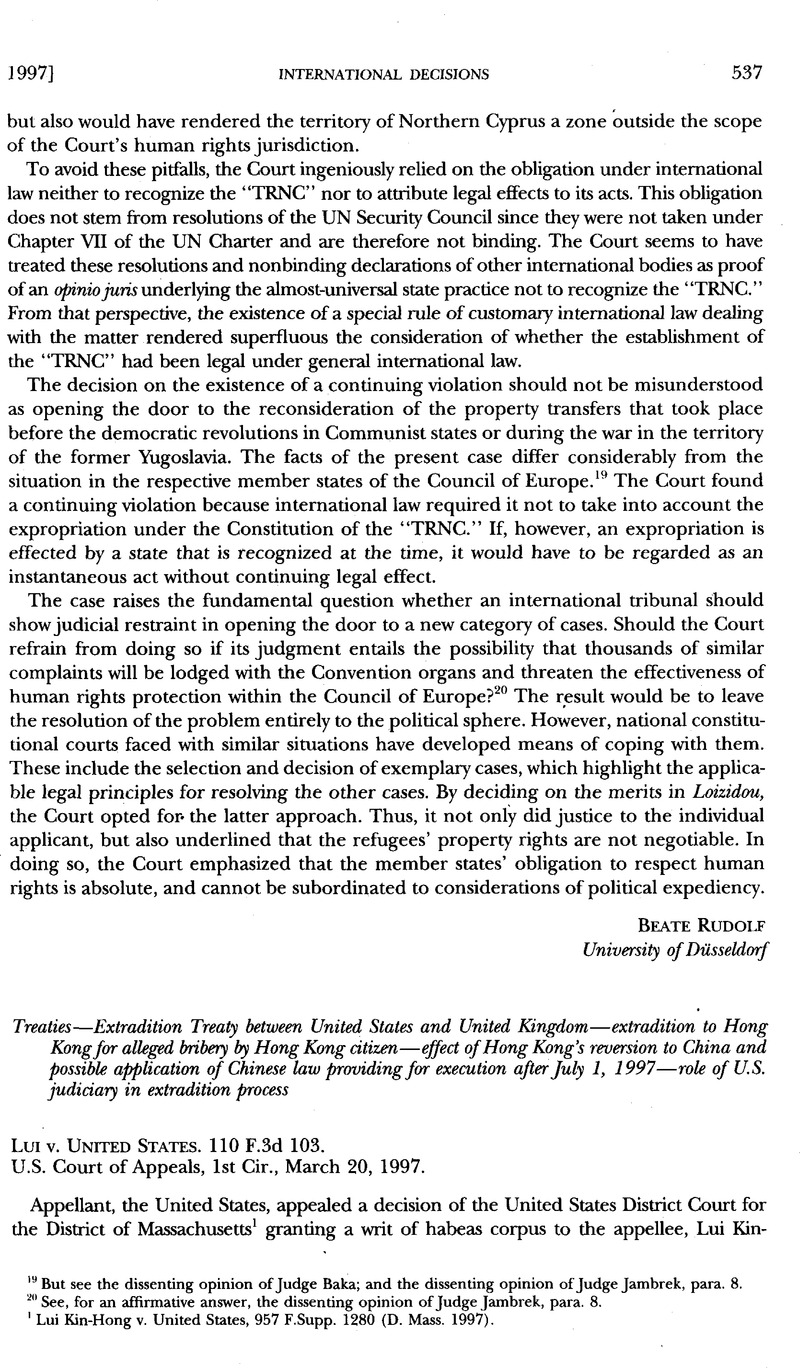No CrossRef data available.
Article contents
Lui v. United States
Published online by Cambridge University Press: 27 February 2017
Abstract

- Type
- International Decisions
- Information
- Copyright
- Copyright © American Society of International Law 1997
References
1 Lui Kin-Hong v. United States, 957 F. Supp. 1280 (D. Mass. 1997).
2 Extradition Treaty, June 8, 1972, UK-U.S., 28 UST 227,109 UNTS 167 [hereinafter Treaty]; and Supplementary Treaty to the Extradition Treaty, June 25, 1985, TIAS No. 12,050 [hereinafter Supplementary Treaty].
3 On December 19, 1995, pursuant to 18 U.S.C.A. §3184 (West Supp. 1996), the United States Attorney’s office filed an extradition complaint in the District Court for the District of Massachusetts setting forth the United Kingdom’s extradition request on behalf of Hong Kong. In response, Magistrate Judge Karol issued a warrant for appellee’s arrest. On December 20, 1995, U.S. marshals, at the request of the United Kingdom, arrested appellee as he disembarked from a plane at Boston’s Logan Airport. Since that time, appellee has been detained awaiting completion of his extradition proceedings.
4 The reversion of Hong Kong to the People’s Republic of China will occur pursuant to the Joint Declaration of the Government of the United Kingdom of Great Britain and Northern Ireland and the Government of the People’s Republic of China on the Question of Hong Kong, with Annexes, Beijing, December 19, 1984, ratified and entered into force on May 27, 1985, 23 ILM 1366 (1984) [hereinafter Joint Declaration].
5 The court of appeals did not address the complex issues related to the entry of the United States into a treaty with a not yet existent entity, and one that is not itself an entity independent of legal and political control by the People’s Republic of China.
6 See Agreement for the Surrender of Fugitive Offenders, Dec. 20, 1996, U.S.-Hong Kong, S. Treaty Doc. No. 105-3 (1997). On March 3, 1997, this treaty was submitted to the Senate for its advice and consent. See 143 Cong. Rec. S1846 (daily ed. Mar. 3, 1997).
7 Joint Declaration, supra note 4.
8 Id., Art. 3(12).
9 Id., Art. 3(3).
10 Id., Art. 3(12).
11 See United States v. Howard, 996 F.2d 1320, 1330 n.6 (1st Cir. 1993) (judicial deference to Executive on interpreting treaties stems at least in part from the fact that the Executive is the branch that most likely wrote and negotiated the treaty).
12 110 F.3d 103, 110.
13 See generally Howard, 996 F.2d at 1330-31 (treaties should be construed liberally so as to effect equality and reciprocity between the parties).
14 See id. at 1329 (in habeas corpus proceedings, rule of noninquiry arose from rationale that existence of extradition treaty indicates that executive and legislative branches consider treaty partner’s justice system sufficiently fair for extradited persons to stand trial).
15 Id.
16 The four provisions in question are (1) the “warrant” provision, requiring that a warrant be presented to the requested country specifying under which laws of the requesting nation appellee would be tried and punished (Treaty, supra note 2, Art. VII(3) & (5)); (2) the “dual Criminality” requirement, which requires the extraditable offense to fit the description of an extraditable offense or a felony under the laws of both signatories (Treaty, Art. Ill); (3) the “political offense” provision, which requires the court to inquire into the reasons and motives for the extradition request of the requesting sovereign (Supplementary Treaty, supra note 2, Art. 3(a)); and (4) the “specialty” provisions, which provide that the appellee can be tried only for the Crimes for which he was extradited, and that the appellee cannot be extradited to a third-party sovereign (Treaty, Art. XII). Surprisingly, appellee did not claim that the reversion of Hong Kong to the United Kingdom constitutes “extradition” to China in violation of Article XII.
17 Lui Kin-Hong, 957 F. Supp. at 1287.
18 The Supplementary Treaty applies to Hong Kong by its terms and the Treaty applies to the United Kingdom and “any territory for the international relations of which the United Kingdom is responsible and to which the Treaty shall have been extended by agreement between the Contracting Parties embodied in an Exchange of Notes.” Treaty, supra note 2, Art. 11(1) (a). The Treaty was made explicitly applicable to Hong Kong by an exchange of diplomatic notes on October 21, 1976. 28 UST at 238-41.
19 957 F. Supp. at 1288.
20 110 F.3d at 111.
21 Id. n.14.
22 See, e.g., U.S. Dep’t of State, Country Rep. on Hum. Rts. Practices 1201-11 (1997) (documenting concerns expressed over steps taken by China to limit civil rights in the future government); Reversion and Rights, Mainichi Daily News (Japan), Feb. 18, 1997, at 2 (“signs are emerging clouding Beijing’s promise to maintain Hong Kong’s present system for the coming 50 years”); Kenji, Yuasa, Domestic, foreign-policy menu provides no easy meal for Chinese leadership, Nikkei Wkly. (Japan), Feb. 24, 1997, at 24 Google Scholar (critics see a Beijing appointed committee vote to rewrite Hong Kong’s Bill of Rights as a signal that China will curb civil liberties in the territory).
Editor’s Note: Subsequent to the preparation of this Report, the court of appeals denied a request for rehearing en banc. 1997 U.S. App. LEXIS 7587 (Apr. 17, 1997) (Stahl, J., dissenting). On May 12, 1997, the Supreme Court denied an application for stay of mandate pending a petition for certiorari. 1997 U.S. LEXIS 3073 (May 12, 1997) (Breyer & Stevens, JJ., dissenting).
In Regina v. Secretary of State for the Home Department, Ex parte Launder (May 21, 1997), the British House of Lords upheld the decision of the Home Secretary to issue a warrant of extradition for the return of Ewan Quayle Launder to Hong Kong. This case will be the subject of a case note in the October issue.




